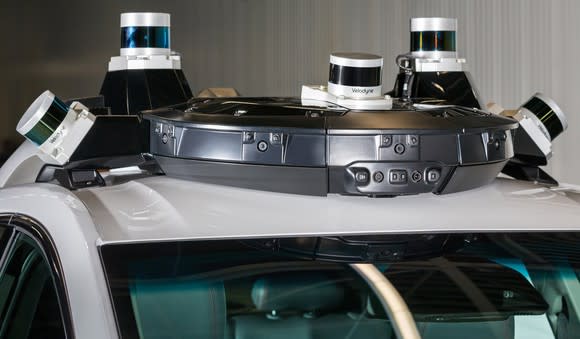General Motors Takes Another Step Toward Mass-Produced Self-Driving Cars
The future is getting closer: General Motors (NYSE: GM) said that it's investing $100 million to upgrade two of its Michigan factories to begin mass producing self-driving cars.
GM has previously said that it will begin deploying its first self-driving vehicle at scale in 2019 as an automated taxi in dense urban environments. The vehicle in question, called the Cruise AV, is an extensively reworked version of GM's well-regarded battery-electric Chevrolet Bolt EV.
Thursday's announcement is another sign that GM is on course to that 2019 goal. Here's what we know.

GM's first self-driving vehicle is a heavily modified Chevy Bolt called the Cruise AV. GM plans to begin mass production of the Cruise AV by 2019. Image source: General Motors.
How and where GM will build the Cruise AV
GM's announcement on Thursday confirmed something that has been obvious for a while: The Cruise AV will be built at GM's Orion Assembly Plant in Orion Township, Michigan. That's where the Bolt is built, and GM said that the Cruise AV will be built on the Bolt's assembly line -- once GM completes a few upgrades and changes, funded by part of that $100 million investment.
The rest of that money will be spent on upgrades and changes at a lesser-known GM factory, the Brownstown Battery Assembly Plant located just south of Detroit. Brownstown is a small factory that assembles the lithium-ion battery packs for GM's hybrid models. It's getting another product: Brownstown has started building the rooftop sensor arrays used on the Cruise AVs.

GM calls this assembly a "roof module." It includes many of the sensors required for self-driving. This one has been installed on the latest version of the self-driving Cruise AV. Image source: General Motors.
Brownstown soon will begin mass producing those roof modules on a new, dedicated assembly line.
What it means: GM is racing to an important finish line
GM is far from the only company racing to deploy a self-driving vehicle, of course. Its stiffest competition probably comes from Waymo LLC, the Alphabet (NASDAQ: GOOG) (NASDAQ: GOOGL) subsidiary that grew out of the old Google Self-Driving Car Project.
Waymo's self-driving system is thought to be at least as advanced as GM's, and the company has already begun to deploy it in a very limited way in Arizona. But Waymo isn't an automaker, though it has a close relationship with Fiat Chrysler Automobiles, among others. The fact that GM has its self-driving car -- the hardware -- ready for mass production right now might give GM an advantage in the race to large-scale deployment.

GM's competition isn't standing still: Slowly but surely, Waymo is deploying its own self-driving taxi fleet. Image source: Fiat Chrysler Automobiles.
Here's why it's important: None of these self-driving systems are close to being finished products. The systems "learn" and improve over time; the more vehicles a manufacturer has on the road, the faster the system will learn.
That's why GM president Dan Ammann has argued that there will be a "first-mover" advantage in deploying self-driving vehicles at scale. Ammann's argument is that the first to deploy at scale will be the first to realize rapid improvements, which, in turn, will deliver a better customer experience -- which, in turn, will lead customers to choose ride-hailing services that use that company's vehicles.
In truth, if Waymo beats GM by a few months, it probably won't matter much five years from now. But GM very badly wants to be in that first tier, the small group of companies that will have viable self-driving taxis in the not-very-distant future.
Thursday's news is a sign that GM's hardware nearly is ready to go. But it may be a while before we know when its software will be ready for prime time.
More From The Motley Fool
Suzanne Frey, an executive at Alphabet, is a member of The Motley Fool's board of directors. John Rosevear owns shares of General Motors. The Motley Fool owns shares of and recommends Alphabet (A shares) and Alphabet (C shares). The Motley Fool has a disclosure policy.
